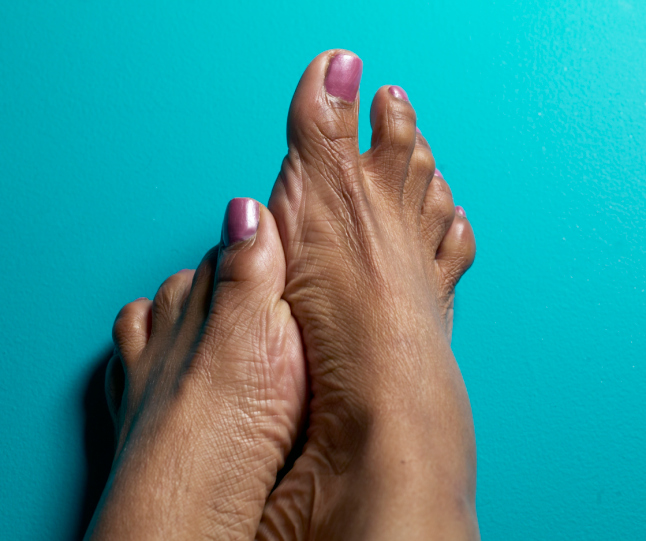
When you have diabetes, regular foot exams are an absolute must. In fact, foot-related problems are the most common reason why someone with diabetes is hospitalized. Furthermore, diabetics are more likely to have a toe, foot or leg amputated compared to the rest of the population. Why? The reason is due to a condition called diabetic peripheral neuropathy (DPN) – nerve damage that’s brought on by chronic high blood sugar. Problems arise when the condition is left untreated and with 60 to 70 percent of people with diabetes expected to develop DPN at some point in their lifetime, it seems to be a growing problem within the community.
BlackDoctor.org recently spoke with Dr. Ali Sadrieh, a LA-based foot surgeon to learn more about how to manage DPN, but more importantly, how to prevent it from happening in the first place.
BlackDoctor.org: What is the importance of getting regular foot exams when you have diabetes?
Dr. Ali Sadrieh: It prevents amputation because diabetic peripheral neuropathy means lack of flow, structural problems like bunions and hammertoes and that can lead to wounds and those wounds can then get infected. In my experience, people who lose their limbs – it’s because of the lack of preventative follow ups. It’s just like when you go to the dentist to prevent cavities. Seeing a podiatrist regularly to prevent these type of problems is a huge thing.
BlackDoctor.org: That makes a lot of sense and as a foot surgeon, what are you specifically looking for during these foot exams?
Dr. Sadrieh: You look for structural problems so any kind of structural pathology so if there’s a bunion, a hammertoe – any kind of pressure point, any area of difficulty in the foot structure in relation to the shoe.
The second component that the doctor would look for is whether or not there’s good blood flow in the toes so they check the pulses and see if they can feel the pulses in the ultrasound.
The third component is more critical, which is what does the skin look like? Are there areas that are callousing, are there openings, lesions, cracks? Is the hair growth normal? What do the nails look like – are they fungal or not, are they brittle? All of these things are clues as to what’s going on inside.
BlackDoctor.org: I came across a statistic that stated 60-70 percent of diabetics will have this issue at some point in their lifetime and that number is really alarming. How important is it for someone who already has DPN to keep their feet healthy?
Dr. Sadrieh: Every statistical analysis has a limit and the limit is how many people do they look at, who do they look at, where are they from, what’s their healthcare like, who are the doctors that are managing them, what’s their socioeconomic status? So, it is true and it’s an outrageous number and we shouldn’t have that, but let’s zoom out for a second and talk a little more specifically about DPN. It’s caused by the loss of nerve function and the nerves are very important. They give you sensation and that tells you if something is cold or hot, if your shoe is too tight or not too tight and all those feedback points tell your foot what to do. So, when you lose nerve function at a high percentage, then you start setting yourself up for all these significant issues like amputation, wounds and a really horrible one is Charcot arthropathy, which is a really horrible thing for diabetics to get. It’s basically when the bones just collapse and the feet turn into mush.
We have to go back to the basics. What can we do to prevent that? Well, it’s very simple: Control the sugars. If we keep the sugars dialed in, if we keep the patient’s diabetes in a very small, low profile management window, then the patient doesn’t get or reduces their chances of getting peripheral neuropathy because peripheral neuropathy happens when the sugars are consistently elevated. It’s time for us to really start a conversation because a lot of the people we’re talking about live in areas that are a food desert. They don’t have nutrient-rich foods that aren’t high in sugars and fats and that breaks down the blood flow, which then breaks down the nerves. What we’re doing is reacting and treating these people, but why don’t we prevent these things by educating people. To really make a shift, something more aggressive needs to happen. The pastors in the churches and leaders in the community need to talk with the people in the community and tell them, “Look this is not the right way to eat.”
BlackDoctor.org: You see a lot of patients – what’s the biggest mistake you see them making?
Dr. Sadrieh: I think the biggest mistake they’re making is not having a tight management on their sugar. If they have the peripheral neuropathy situation going on, what needs to happen is they need to accommodate the foot so that there are no pressure points and there is no pressure on the foot itself.
Once you get peripheral neuropathy, you’ve got to be careful. You’ve got to check the temperature of the water before you step in the shower because you could burn yourself and not even feel it, you’ve got to make sure your shoes don’t have any pressure points, you’ve got to feel inside your shoes before you put them on. We’ve seen cases where patients put their shoes on and their kid left a little Lego brick in their shoe and they walked around all day and didn’t even feel it. So, acknowledging, “I don’t feel anything anymore. My feet don’t give me feedback. I need to try something else to see what’s going on,” is important, but ultimately, it’s like don’t get there, you know? Let’s not get you there, let’s prevent getting there.
BlackDoctor.org: What is the best piece of advice you would give to DPN patients in terms of managing their condition?
Dr. Sadrieh: Keep your sugars controlled because again, that’s what’s going to help slow down the progression and keep it from getting worse. The other thing is that it’s really important to have a regular routine with a podiatrist like you do with your dentist – regularly and routinely. It’s an ongoing problem – it can’t be fixed in one shot.








